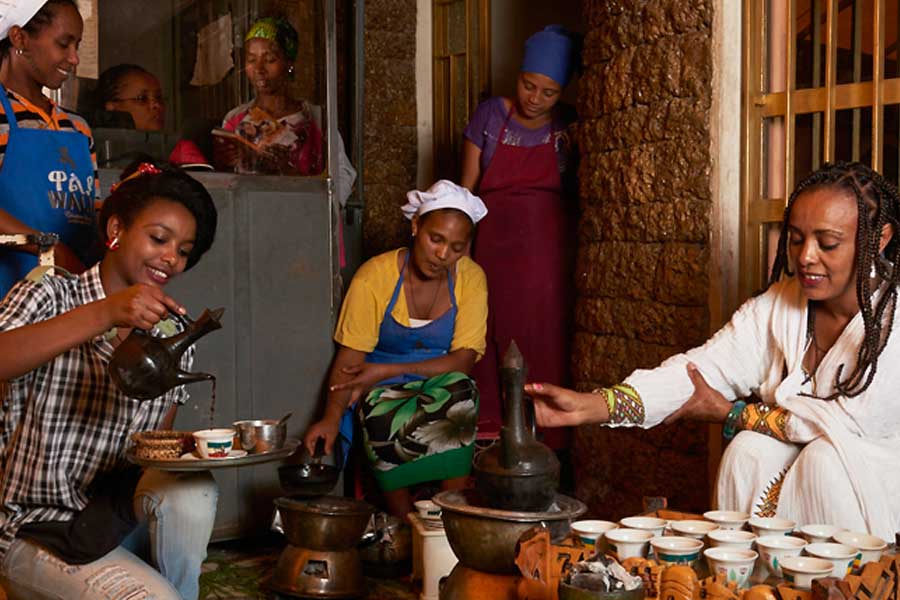
Viewpoints | Aug 28,2021
Feb 19 , 2022
By Tigist Solomon
One of the fundamental rights of children is education, whatever the socio-economic status involved. Beyond the moral reasons for this the United Nations Convention on the Rights of the Child also obliges all member States to provide education to all children regardless of sex, race or religion.
Unfortunately, this is not always the case. In Ethiopia, a large proportion of adolescents, between the ages of 11 and 21, are lacking education services. For at lower secondary school ages, around half are not receiving education, according to the latest available data from the World Bank. It is not surprising as a recent project I was involved in conformed in rural areas of the Amhara and Oromia regional states, especially for girls. Despite the difference in values, language and tradition, they face similar living conditions as adolescent girls.
Girls that have gone to school usually attended up to grade four but never had the chance of going to school again, which tracks with the high dropout rates in rural areas. Those with access to education start school at a later age, probably at around 10. Dropout rates are high among adolescent girls as they have household responsibilities with no time available for going to school.
Furthermore, schools in remote areas are often inaccessible, requiring long walks. Inaccessibility of basic needs such as electricity for doing homework late also discourages girls from going to school. Another factor that prevents them is the limited attention given by parents to education with preference to child marriage to overcome the household burden. It is believed that married girls would generate income to support themselves and their families financially. Instead of going to school, the girls are busy doing house chores such as cleaning the house, cooking meals, brewing coffee, looking after cattle, fetching water and firewood and going to the market. These chores were part of their daily routines, giving them almost no time to play or study.
In my own experience, the girls do not complain of being busy with household responsibilities and were rather glad to get the opportunity to support their parents and relatives with chores and income generating activities. But even their work activities are not without difficulties. They have to walk kilometers every day to fetch water, collect firewood, and come back the distance carrying back-breaking loads. They risk attack by wild animals, as well as experiencing physical, sexual and verbal harassment during their long journeys. Neither are health centres easily accessible, often only reachable after treks inconvenient to public transport. Even then, they are not well equipped if the girls require intensive treatment.
The effort has gone into changing this unfortunate circumstance by the government and non-profit organisations to promote education, notably primary schooling in the country including in remote areas. Nevertheless, more advocacy for the accessibility of education to all children, including those whose parents have limited income and live in remote areas, should be done. It would eventually enable the government to have a good understanding of the living experience of children and adolescents living in poor households and in remote areas and thereby better oversee what they lack from their primary needs often considered as their basic rights.
Prioritising education and health as critical foundations to improving standards of living will initiate strategies and plans to ameliorate the living conditions of adolescent girls in remote areas to access education and protect their wellbeing. Access to education is a basic right of all children and parents and families should have a good awareness of this importance and need the necessary support.
PUBLISHED ON
Feb 19,2022 [ VOL
22 , NO
1138]


Viewpoints | Aug 28,2021

Covid-19 | Apr 08,2020

Viewpoints | Apr 29,2023

Radar | Dec 19,2018

Commentaries | Oct 31,2020

Radar | Dec 10,2022

Viewpoints | Jul 01,2023

Fortune News | Feb 20,2021

Radar | Sep 24,2022

Fortune News | Sep 18,2022

My Opinion | 131507 Views | Aug 14,2021

My Opinion | 127863 Views | Aug 21,2021

My Opinion | 125841 Views | Sep 10,2021

My Opinion | 123471 Views | Aug 07,2021

Dec 22 , 2024 . By TIZITA SHEWAFERAW
Charged with transforming colossal state-owned enterprises into modern and competitiv...

Aug 18 , 2024 . By AKSAH ITALO
Although predictable Yonas Zerihun's job in the ride-hailing service is not immune to...

Jul 28 , 2024 . By TIZITA SHEWAFERAW
Unhabitual, perhaps too many, Samuel Gebreyohannes, 38, used to occasionally enjoy a couple of beers at breakfast. However, he recently swit...

Jul 13 , 2024 . By AKSAH ITALO
Investors who rely on tractors, trucks, and field vehicles for commuting, transporting commodities, and f...

Jun 28 , 2025
Meseret Damtie, the assertive auditor general, has never been shy about naming names...

Jun 21 , 2025
A well-worn adage says, “Budget is not destiny, but it is direction.” Examining t...

Jun 14 , 2025
Yet again, the Horn of Africa is bracing for trouble. A region already frayed by wars...

Jun 7 , 2025
Few promises shine brighter in Addis Abeba than the pledge of a roof for every family...

Jun 29 , 2025
Addis Abeba's first rains have coincided with a sweeping rise in private school tuition, prompting the city's education...

Jun 29 , 2025 . By BEZAWIT HULUAGER
Central Bank Governor Mamo Mihretu claimed a bold reconfiguration of monetary policy...

Jun 29 , 2025 . By BEZAWIT HULUAGER
The federal government is betting on a sweeping overhaul of the driver licensing regi...

Jun 29 , 2025 . By NAHOM AYELE
Gadaa Bank has listed 1.2 million shares on the Ethiopian Securities Exchange (ESX),...